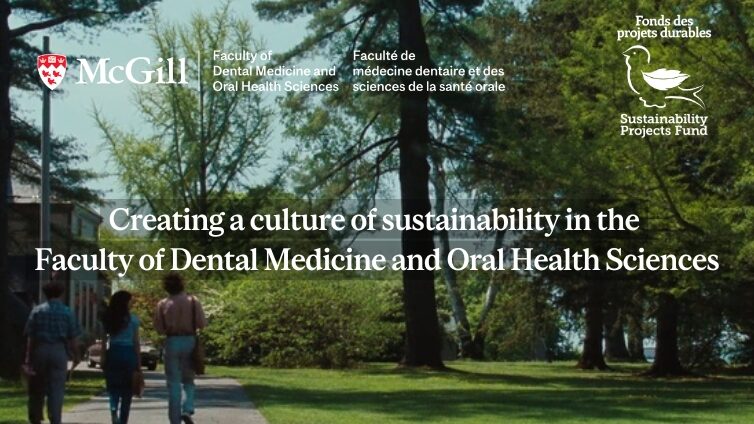
The Faculty of Dental Medicine and Oral Health Sciences at McGill University is taking significant strides towards environmental sustainability under the guidance of Professor Dr. Christophe Bedos. With a new initiative funded by the McGill Sustainability Projects Fund, Dr. Bedos is leading efforts to integrate eco-friendly practices into dental education and operations.
A Step Towards a Greener Future
The initiative “Creating a Culture of Sustainability in the McGill Faculty of Dental Medicine and Oral Health Sciences” has received $54,500 for its first phase, focusing on planning.
“It is a fantastic opportunity for all of us at the Faculty to do our part in addressing the issues of climate change and loss of biodiversity,” says Dr. Bedos. “We will probably be among the first medical and dental faculties in the world to do so.”
The project involves the establishment of a sustainability committee within the Faculty, tasked with assessing direct and indirect carbon emissions, waste, and water consumption. This comprehensive evaluation aims to develop objectives and strategies for eco-sustainability, requiring collaboration from faculty members, students, staff, and even patients from the Faculty’s dental clinics.
To facilitate this complex undertaking, the Faculty of Dental Medicine and Oral Health Sciences is partnering with Synergie Santé Environnement (SSE), a non-governmental organization experienced in guiding health institutions toward environmental sustainability. Although the initial funding covers one year, there is potential for an additional two years of support from the Sustainability Projects Fund, allowing the project to implement a waste and carbon reduction strategy.
An Ongoing Commitment to Sustainable Dentistry
Dr. Bedos’ commitment to sustainability is not new. Earlier in 2024, he received $150,000 from the Institut national de santé publique du Québec for the project “Former les professionnels pour une dentisterie écoresponsable” (Training Professionals for Environmentally Responsible Dentistry). This project’s goal is to create an online credited training for all oral health professionals, focusing on identifying and reducing greenhouse gas emissions while maintaining quality dental services. PhD Dental Sciences student Newsha Toreihi, whose thesis focuses on sustainable dentistry, will work alongside Dr. Bedos on this project.
Driving Force and Future Vision
When asked what drove him to launch these initiatives, Dr. Bedos explains that “two and a half years ago, the Fonds de recherche du Québec – Santé, which finances the Réseau intersectoriel en santé buccodentaire et osseuse durable (RiSBOd) which I am the co-director of, rethought their funding approach. I started researching sustainability and realized that the situation of our planet was critical and required urgent action to reduce greenhouse gas emissions. Consequently, we proposed that sustainable dentistry would become a strategic research priority in Quebec. As a researcher myself, I developed a research axis on sustainability and began integrating it into my own work.”
Dr. Bedos envisions the sustainability initiative evolving significantly beyond the initial one-year funding period. “The first year is about assessment and building a report with SSE on the Faculty’s carbon footprint. The second year and beyond will involve strategizing and implementing the measures the committee identifies.”
Assessing and Reducing Environmental Impact
The process of assessing direct and indirect carbon emissions, waste, and water consumption within the Faculty is thorough. Synergie Santé Environnement has already conducted a preliminary report after touring the clinics. “They are the ones with the experience and capacity to estimate carbon emissions,” says Dr. Bedos. “They’ll help us develop the sustainability committee and provide training for our Faculty members, students, and staff.”
The transportation mode of faculty staff, students, and patients will be analysed as findings from previous studies have identified the impact of transportation on carbon emissions to be significant. The committee will explore ways to reduce these emissions, such as reducing travel frequency or changing transportation methods.
Waste management is another point: while non-reusable tools and gloves are the most visible sources of waste, studies in the United Kingdom revealed they account for about 1% of carbon emissions. “During their first visit, SSE took a sample of the plastic teeth that students practice on. Some are barely used and go to waste, so SSE sent them to a recycling company to see if they can be recycled,” Dr. Bedos explains. The committee will also examine the use of reusable versus non-reusable gowns and the environmental impact of ordering supplies in bulk versus smaller, more frequent orders.
Engaging the Faculty Community
The sustainability committee will begin in fall 2024, involving staff and students in the estimation and strategy development processes. “Everyone’s voice matters: undergraduates, graduate students, professors, staff, clinicians, and patients,” Dr. Bedos emphasizes. There will be training sessions, seminars with Newsha Toreihi, and town halls to report progress and engage the entire Faculty community.
Looking Ahead
The Faculty of Dental Medicine and Oral Health Sciences’ commitment to sustainability is a significant step towards a greener future. Through dedicated leadership and collaborative efforts, the initiative aims to set a precedent for medical and dental faculties worldwide. Dr. Bedos’ innovative approach showcases the Faculty’s dedication to environmental stewardship and its role in addressing global challenges such as climate change and biodiversity loss.
With continued support and active participation from the Faculty community, the initiative promises to pave the way for sustainable practices in dental medicine, benefiting both the environment and future generations of dental professionals.

